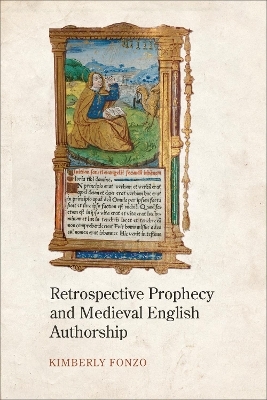
Retrospective Prophecy and Medieval English Authorship
Seiten
2022
University of Toronto Press (Verlag)
978-1-4875-6347-9 (ISBN)
University of Toronto Press (Verlag)
978-1-4875-6347-9 (ISBN)
This book examines the reception of medieval authors’ works in order to dispel the inaccurate and misleading prophetic reputations that have been attributed to them.
The prescience of medieval English authors has long been a source of fascination to readers. Retrospective Prophecy and Medieval English Authorship draws attention to the ways that misinterpreted, proleptically added, or dubiously attributed prognostications influenced the reputations of famed Middle English authors. It illuminates the creative ways in which William Langland, John Gower, and Geoffrey Chaucer engaged with prophecy to cultivate their own identities and to speak to the problems of their age.
Retrospective Prophecy and Medieval English Authorship examines the prophetic reputations of these well-known medieval authors whose fame made them especially subject to nationalist appropriation. Kimberly Fonzo explains that retrospectively co-opting the prophetic voices of canonical authors aids those looking to excuse or endorse key events of national history by implying that they were destined to happen. She challenges the reputations of Langland, Gower, and Chaucer as prophets of the Protestant Reformation, Richard II’s deposition, and secular Humanism, respectively.
This intellectual and critical assessment of medieval authors and their works successfully makes the case that prophecy emerged and recurred as an important theme in medieval authorial self-representations.
The prescience of medieval English authors has long been a source of fascination to readers. Retrospective Prophecy and Medieval English Authorship draws attention to the ways that misinterpreted, proleptically added, or dubiously attributed prognostications influenced the reputations of famed Middle English authors. It illuminates the creative ways in which William Langland, John Gower, and Geoffrey Chaucer engaged with prophecy to cultivate their own identities and to speak to the problems of their age.
Retrospective Prophecy and Medieval English Authorship examines the prophetic reputations of these well-known medieval authors whose fame made them especially subject to nationalist appropriation. Kimberly Fonzo explains that retrospectively co-opting the prophetic voices of canonical authors aids those looking to excuse or endorse key events of national history by implying that they were destined to happen. She challenges the reputations of Langland, Gower, and Chaucer as prophets of the Protestant Reformation, Richard II’s deposition, and secular Humanism, respectively.
This intellectual and critical assessment of medieval authors and their works successfully makes the case that prophecy emerged and recurred as an important theme in medieval authorial self-representations.
Kimberly Fonzo is an assistant professor in the Department of English at the University of Texas at San Antonio.
Introduction
1. The Sybil and Merlin: Political Prophecy in the French and English Royal Courts
2. William Langland’s Parodic Prophecies
3. Henry IV and the Post Facto Construction of a Prophetic John Gower
4. The Legacy of “Chaucer’s Prophecy” in The House of Fame
Afterword
| Erscheinungsdatum | 05.04.2022 |
|---|---|
| Verlagsort | Toronto |
| Sprache | englisch |
| Maße | 159 x 235 mm |
| Gewicht | 410 g |
| Themenwelt | Geschichte ► Teilgebiete der Geschichte ► Religionsgeschichte |
| Geisteswissenschaften ► Philosophie ► Philosophie des Mittelalters | |
| Geisteswissenschaften ► Sprach- / Literaturwissenschaft ► Anglistik / Amerikanistik | |
| Geisteswissenschaften ► Sprach- / Literaturwissenschaft ► Literaturwissenschaft | |
| ISBN-10 | 1-4875-6347-7 / 1487563477 |
| ISBN-13 | 978-1-4875-6347-9 / 9781487563479 |
| Zustand | Neuware |
| Informationen gemäß Produktsicherheitsverordnung (GPSR) | |
| Haben Sie eine Frage zum Produkt? |
Mehr entdecken
aus dem Bereich
aus dem Bereich
Von den Anfängen bis zur Gegenwart
Buch | Hardcover (2022)
C.H.Beck (Verlag)
34,00 €
Herkunft, Blüte, Weg nach Osten
Buch | Hardcover (2024)
C.H.Beck (Verlag)
39,00 €


